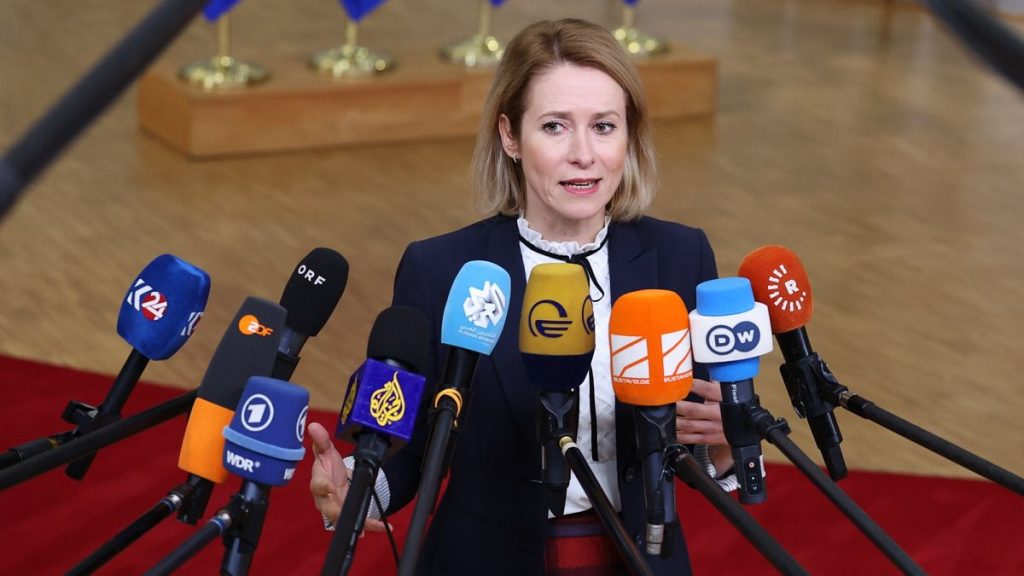The ongoing war in Ukraine has ignited a fervent debate within the European Union and the international community regarding the appropriate time and conditions for initiating peace negotiations between Ukraine and Russia. Estonian Prime Minister Kaja Kallas has emerged as a vocal proponent against premature negotiations, arguing that rushing into a settlement would ultimately disadvantage Ukraine and set a dangerous precedent for international conflicts. Kallas emphasizes the need for a strong and unified stance against Russia, drawing parallels with Syria to illustrate that Russia is not insurmountable when faced with concerted opposition. She emphasizes the collective power of the EU and the importance of leveraging this strength to secure a favorable outcome for Ukraine. This sentiment is echoed by Lithuanian President Gitanas Nausėda, who dismisses current calls for negotiation as unproductive given Russia’s ongoing offensive and lack of genuine interest in peaceful resolution. Instead, he urges the EU to bolster its military and financial support for Ukraine, enabling the country to negotiate from a position of strength.
The recent US presidential election has added another layer of complexity to the situation. Former President Donald Trump’s campaign promise to swiftly end the war has fueled speculation about potential negotiation frameworks. His team has floated ideas involving a combination of incentives and pressures, potentially involving the suspension of US military aid to Ukraine as leverage to encourage their participation in talks with Russia. Conversely, aid would be increased if Russia refused to engage. This approach, still in its conceptual stages, has also raised the possibility of a peacekeeping mission within Ukraine to enforce any future agreement. While French President Emmanuel Macron has expressed openness to European boots on the ground, this prospect remains highly controversial among other EU member states.
Within the EU, opinions on the timing and nature of potential negotiations diverge significantly. Belgian Prime Minister Alexander De Croo prioritizes a Ukrainian victory and the repulsion of Russian forces as preconditions for any peace talks, while acknowledging the eventual need for international involvement in securing and maintaining peace. Irish Prime Minister Simon Harris similarly considers discussions about peacekeeping premature given Russia’s continued aggression. This internal division within the EU underscores the challenges in forging a united front on this critical issue. The debate is further complicated by the varying stances of individual member states, with figures like Hungarian Prime Minister Viktor Orbán advocating for a ceasefire and Slovakian politician Robert Fico urging the EU to transition from an arms supplier to a peacemaker. These differing perspectives highlight the delicate balance between seeking a peaceful resolution and ensuring that any settlement is just and sustainable for Ukraine.
The involvement of North Korean soldiers fighting alongside Russian forces in Ukraine has significantly escalated the conflict and added a new dimension to the debate surrounding negotiations. This intervention, estimated to involve thousands of North Korean troops, not only bolsters Russia’s depleted forces but also expands the geographical scope and complexity of the war. Ukrainian President Volodymyr Zelenskyy has expressed concern about the potential for a substantial increase in North Korean troop deployment, further emphasizing the urgency of a unified response from the US and the EU. Zelenskyy’s plea for transatlantic unity underscores the importance of a coordinated international effort to counter Russian aggression and support Ukraine’s defense.
The contrasting viewpoints on negotiations, ranging from calls for immediate dialogue to prioritizing a Ukrainian military victory as a prerequisite for talks, reflect the intricate geopolitical landscape and the high stakes involved. The presence of North Korean troops adds a further layer of complexity, underscoring the potential for the conflict to escalate and the need for a robust and unified response from the international community. The debate over negotiations highlights the challenging balance between seeking a peaceful resolution and ensuring that any settlement does not come at the expense of Ukraine’s sovereignty and security.
The central question remains: how to achieve a just and lasting peace in Ukraine. Premature negotiations, driven by political expediency or pressure from external actors, risk solidifying Russian gains and undermining Ukraine’s long-term prospects. On the other hand, a protracted conflict, exacerbated by the involvement of additional actors like North Korea, carries the risk of further devastation and human suffering. Finding the optimal path towards a peaceful resolution requires careful consideration of the evolving military dynamics, the political landscape, and the long-term implications for regional stability. The EU’s internal divisions, coupled with the differing approaches of international actors, underscore the need for a coordinated and principled strategy that prioritizes Ukraine’s interests while seeking a sustainable end to the conflict.

